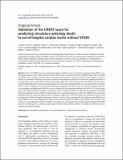Validation of the CREST score for predicting circulatory-aetiology death in out-of-hospital cardiac arrest without STEMI
Abstract
Aims: The CREST tool was recently developed to stratify the risk of circulatory-aetiology death (CED) in out-of-hospital cardiac arrest (OHCA) patients without ST-elevation myocardial infarction (STEMI). We aimed to validate the CREST score using an external cohort and determine whether it could be improved by the addition of serum lactate on admission. Methods: The study involved the retrospective analysis of consecutive patients admitted to a single tertiary centre with OHCA of presumed cardiac origin over a 51-month period. The CREST score was calculated by attributing points to the following variables: Coronary artery disease (CAD), non-shockable Rhythm, Ejection fraction <30%, cardiogenic Shock at presentation and ischaemic Time ≥25 minutes. The primary endpoint was CED vs neurological aetiology death (NED) or survival. Results: Of 500 patients admitted with OHCA, 211 did not meet criteria for STEMI and were included. 115 patients died in hospital (71 NED, 44 CED). When analysed individually, CED was associated with all CREST variables other than a previous diagnosis of CAD. The CREST score accurately predicted CED with excellent discrimination (C-statistic 0.880, 95% CI 0.813-0.946) and calibration (Hosmer and Lemeshow P=0.948). Although an admission lactate ≥7 mmol/L also predicted CED, its addition to the CREST score (the C-AREST score) did not significantly improve the predictive ability (CS 0.885, 0.815-0.954, HS P=0.942, X2 difference in -2 log likelihood =0.326, P=0.850). Conclusion: Our study is the first to independently validate the CREST score for predicting CED in patients presenting with OHCA without STEMI. Addition of lactate on admission did not improve its predictive ability.
Citation
Jones , T N , Kelham , M , Rathod , K S , Knight , C J , Proudfoot , A , Jain , A K , Wragg , A , Ozkor , M , Rees , P , Guttmann , O , Baumbach , A , Mathur , A & Jones , D A 2021 , ' Validation of the CREST score for predicting circulatory-aetiology death in out-of-hospital cardiac arrest without STEMI ' , American Journal of Cardiovascular Disease , vol. 11 , no. 6 , pp. 723-733 . < https://www.ncbi.nlm.nih.gov/pmc/articles/PMC8784677/ >
Publication
American Journal of Cardiovascular Disease
Status
Peer reviewed
ISSN
2160-200XType
Journal article
Collections
Items in the St Andrews Research Repository are protected by copyright, with all rights reserved, unless otherwise indicated.

